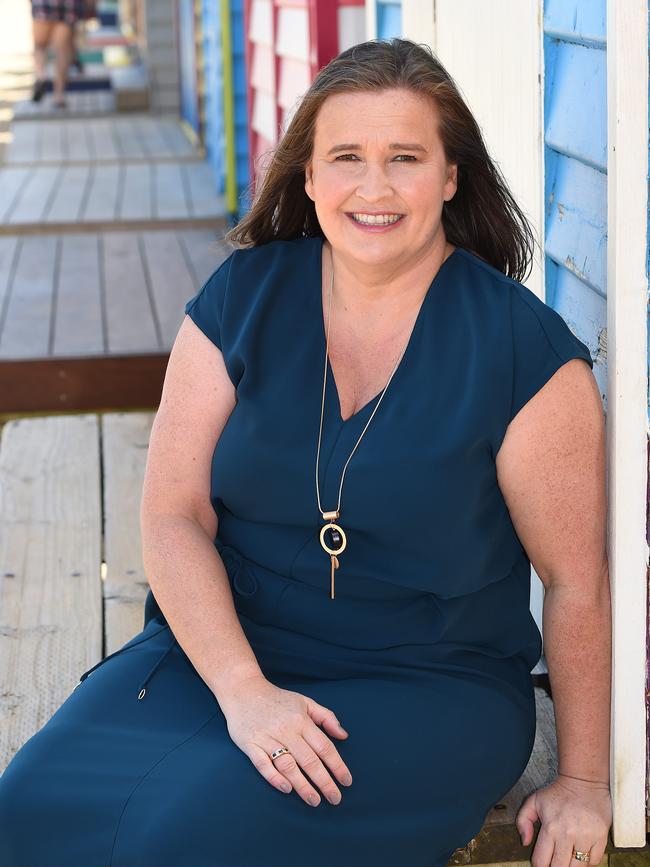Sex Discrimination Commissioner on pandemic’s impact on women
From the day of lockdown in Australia, Sex Discrimination Commissioner Kate Jenkins knew women would be hit hardest by the pandemic fallout. And as the economy struggles to restart, she says they are again being ignored. READ MORE e
NSW
Don't miss out on the headlines from NSW. Followed categories will be added to My News.
- Paracetamol ‘not safe’ during pregnancy: research
- Suicide pain: First my son, then my devastated wife
In early autumn, Sex Discrimination Commissioner Kate Jenkins was about to embark on a year of domestic and international travel to share the findings of the Respect@Work inquiry which had been tabled in parliament on March 5.
The report found: “Workplace sexual harassment is prevalent and pervasive: it occurs in every industry, in every location and at every level, in Australian workplaces. Australians, across the country, are suffering the financial, social, emotional, physical and psychological harm associated with sexual harassment. This is particularly so for women.”
Then the pandemic lockdown hit and the 52-year-old mother-of-two found herself stuck at in her Melbourne home, juggling working remotely, as was her lawyer husband, and home schooling an 11-year-old and 14-year-old. The family is still in lockdown.
As the economic impact of the lockdown took hold across the nation, she could predict with devastating accuracy who would be hardest hit. Women.

“When I look at the start of COVID, we know that women were losing their jobs at a faster rate and they were starting from a worse position in the first place,” Jenkins says. .
“I could see very early how and why women were taking the biggest hit. We know what industries women work in, they were working in the industries on the front line or shut down because they tend to do the face-to-face work, retail, hospitality, tourism, the arts, but also healthcare and teaching, so either at risk of contracting (the virus) or losing their jobs.”
Women, especially mothers, were also more likely to be in casual jobs or part-time, or lower level jobs. They had less security to begin with.
“They also were doing more of the domestic and care work and when children came home the Institute of Family Studies did research, everyone thought ‘Oh, now the dads will now start doing more’ but the stats were showing women were trying to do their jobs and homeschool and doing even more cleaning.”
Women were also in the home more, which meant more violence for some.
“The research has told us there has been more calls. Violence has continued and particularly there has been an increase in people experiencing violence for the first time and an increase in online violence during the time of the lockdown. The E-safety commissioner reported in April, Image based abuse (revenge porn) was up 600 per cent.”
GET MORE CONNECTED:
What you get as a subscriber to The Daily Telegraph
Download our app and stay up to date anywhere, anytime
It was, depressingly, more of the same gendered disadvantage Jenkins has tried to address since taking up the role of the Sex Discrimination Commissioner at the Australian Human Rights Commission in 2016.
From 30-minute haircuts, to infrastructure projects in construction to the budget response to support more male-dominated trades, the government response to the pandemic reaffirmed to Jenkins that the gender lens is still very much perched the end of the male nose, despite how far we have come since the first Sex Discrimination Act was introduced in 1984.
The government has so far spent $2.8 billion to encourage employers to keep their apprentices on and plans to spend another $1.2 billion on new hires. But just 14,000 of the 180,000 apprentices supported so far are women, government data shows.
“I do think having women at the table and prioritising women’s jobs is something we need. I don’t know if its politics or just not understanding, but in previous depressions and the GFC, the way out has been building projects and I think this is a very different recession. The previous ways we have dealt with these issues might not be the best way.
“Ensuring support and recognition of female-dominated industries at a time when we have relied on social and health assistance workers who are predominantly women, and teachers and child care when we have come through this pandemic really dependent on the female dominated workforces, I would like to see a focus on jobs and support for those industries.”

Sex discrimination can be very subtle, or like a sledgehammer, but it is not one brick that makes a wall of disadvantage, it is many, stacked together and cumulating in a lifelong cost.
“I think every woman has a story of gendered impacts over their lifetime. It might not be sexual harassment, but it might be what job they have taken, sexism, and gendered influence where their sex has impacted critical life decisions even if they didn’t realise it at the time. Understanding that compounding effect on a woman, and the huge damage at the end, but our laws have focused on one bad incidence (like a harassment).
“Whether conscious or not, almost every woman’s life is affected by attitudinal and systemic barriers that are based on stereotype views of what women and men should do at home and at work.
“Most women end up being the primary carer, being the one who works part-time, the one who works in the lower paid job and I don’t think women keep choosing it. I think there are social expectations and it is systemic.”
And over a lifetime that culminates in women having less, despite having done most of the unpaid domestic work and child care. Part-time mothers have a hard time cracking back into full-time work.
“You start thinking it was your choice, but later on you realise there was a lot of social expectation in your choice but no one is opening the doors to let you back in and that is pretty dire,” Jenkins says.
“Older women are the faster growing group of homeless, older women have just over half of men’s retirement savings. There is a lifetime accumulation of the problem and it happens over and over again.”
Jenkins began her career as a young workplace lawyer at Freehills in the early 1990s and gender shaped her career, albeit in a positive way.
“The Sex Discrimination Act was in place but it hadn’t hit the white collar environment. When I started there in the early 90s all these organisations that had never thought about sexual harassment before were getting these cases and coming to Freehills saying ‘we need help. How do we defend these cases? And what do we do to stop sexual harassment?’. I was quite junior, but no one, particularly the guys had done that work before, so I got given it, so it was sexist, but a sexist trend that worked out in my favour, becoming the first partner who was an equal opportunity partner.”

At the time, women of her generation held great hopes that the Sex Discrimination Act would fix things.
“At the time, there was this sense this would naturally tumble, all those barriers will tumble for women,” Jenkins says.
Three decades later, the Harvey Weinstein case sparked the Me Too movement which launched the Respect@Work inquiry that sadly found not much had changed. And women, and some men, are still too scared to speak out, an issue Jenkins fears will be compounded as the current recession deepens.
“The Weinstein story triggered a global conversation about sexual harassment, it was a critical moment, not because a social media campaign fixes a deeply embedded social problem, but it started a conversation that surfaced what you and I knew existed. It has highlighted the prevalence of sexual harassment, the harm of sexual harassment and also surfaced the silence.
“Even today the question is always why don’t women complain and that has started a conversation about the very good reasons why women, and men, don’t complain.
“Because people are so much more concerned with losing their jobs, I think that will compound the fear of complaining.
“Sexual harassment happens, we know there is a high prevalence rate, one in three workers in the last five years on our 2018 survey. In that survey only 17 per cent raised complaints of sexual harassment. That low rate of complaint has been pretty consistent since we have been doing that survey since 2003.
“I think when we have surveyed on why people don’t complain a big reason is they fear for their careers and fear for their reputations and (that) nothing will be done about it, that it’s not serious enough, that they shouldn’t complain and I think fear for job (security) will be higher because we are in such an insecure job workplace now.”
